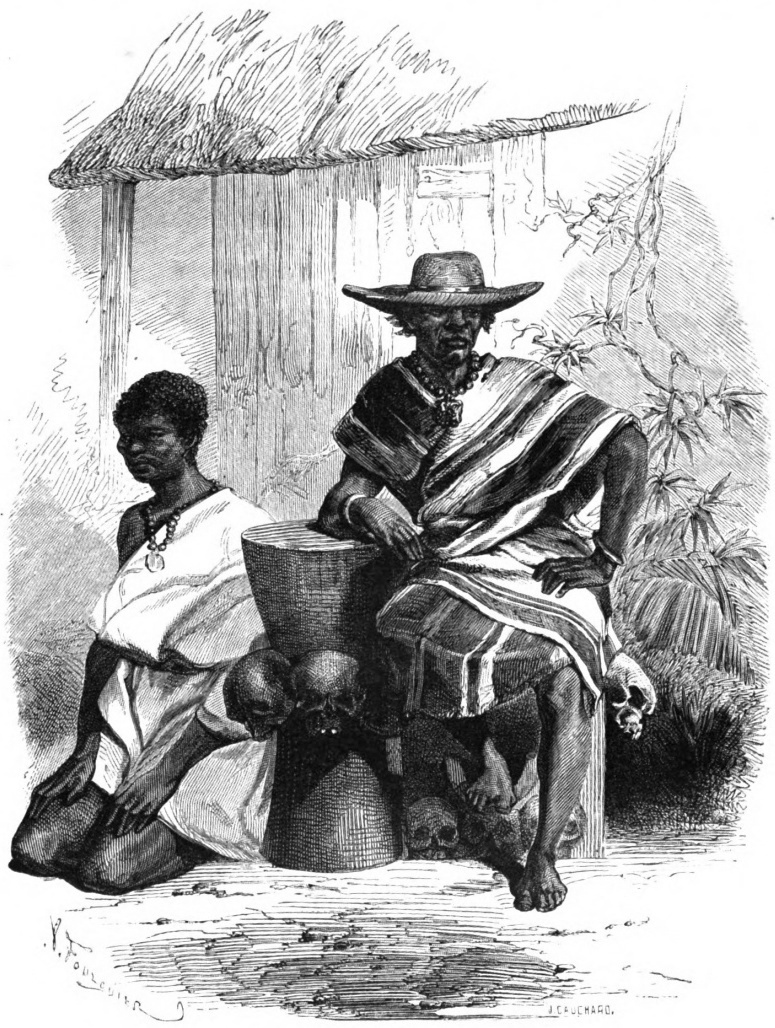|
Visesegan
Visesegan was an African official, the favorite wife of Glele, King of Dahomey. Visesegan was tononu of the Dahomey, a rank comparable to being the head of the wives. The first records of her date to 1863, when Richard Burton recorded that she was one of Yavedo's assistants. She rose to be the most powerful woman by the 1870s, being in charge of other women living in the palace. Visesegan was additionally the wealthiest woman in the palace and controlled commercial licenses. She first supported Ahanhanzo and later her son Sasse Koku as the successor to her husband. When Béhanzin Gbehanzin also known as Béhanzin ( – 10 December 1906) is considered the eleventh (if Adandozan is not counted) King of Dahomey, modern-day Republic of Benin. Upon taking the throne, he changed his name from Kondo. Following his father ... became king instead, Visesegan led an attempt to overthrow him, which ultimately was unsuccessful. She lost her property as a result. She had also advocated ... [...More Info...] [...Related Items...] OR: [Wikipedia] [Google] [Baidu] |
Glele
Glele, or Badohou (died December 29, 1889), was the tenth King of Dahomey, ruling from 1858 until his suicide in 1889. Life Badohou, who took the throne name Glele, is considered (if Adandozan is not counted) to be the tenth King of the Aja kingdom of Dahomey (part of modern-day Benin). He succeeded his father, Ghezo, and ruled from 1858 to 1889. Glele continued his father's successful war campaigns, in part to avenge his father's death, and to capture slaves. During his rule he sustained Dahomey's renaissance as a center of palm oil sales and slave trade. Glele also signed treaties with the French, who had previously acquired a concession in Porto-Novo from its king. The French were successful in negotiating with Glele and receiving a grant for a customs and commerce concession in Cotonou during his reign. Glele resisted British diplomatic overtures, however, distrusting their manners and noting that they were much more activist in their opposition to the History of slavery, sl ... [...More Info...] [...Related Items...] OR: [Wikipedia] [Google] [Baidu] |
King Of Dahomey
The King of Dahomey (''Ahosu'' in the Fon language) was the ruler of Dahomey, a West African kingdom in the southern part of present-day Benin, which lasted from 1600 until 1900 when the French Third Republic abolished the political authority of the Kingdom. The rulers served a prominent position in Fon ancestor worship leading the Annual Customs and this important position caused the French to bring back the exiled king of Dahomey for ceremonial purposes in 1910. Since 2000, there have been rival claimants as king and there has so far been no political solution. The Palace and seat of government were in the town of Abomey. Early historiography of the King of Dahomey presented them as absolute rulers who formally owned all property and people of the kingdom. However, recent histories have emphasized that there was significant political contestation limiting the power of the king and that there was a female ruler of Dahomey, Hangbe, who was largely written out of early histor ... [...More Info...] [...Related Items...] OR: [Wikipedia] [Google] [Baidu] |
Richard Francis Burton
Captain (British Army and Royal Marines), Captain Sir Richard Francis Burton, Order of St Michael and St George, KCMG, Royal Geographical Society#Fellowship, FRGS, (19 March 1821 – 20 October 1890) was a British explorer, army officer, orientalist writer and scholar. He was famed for his travels and explorations in Asia, Africa and South America, as well as his extensive knowledge of languages and cultures, speaking up to 29 different languages. Born in Torquay, Devon, Burton joined the Bombay Army as an officer in 1842, beginning an eighteen-year military career which included a brief stint in the Crimean War. He was subsequently engaged by the Royal Geographical Society (RGS) to explore the East African coast, where Burton along with John Hanning Speke led an expedition to discover the source of the Nile and became the first European known to have seen Lake Tanganyika. He later served as the British consul (representative), consul in Bioko, Fernando Pó, Santos, São Paulo, ... [...More Info...] [...Related Items...] OR: [Wikipedia] [Google] [Baidu] |
Béhanzin
Gbehanzin also known as Béhanzin ( – 10 December 1906) is considered the eleventh (if Adandozan is not counted) King of Dahomey, modern-day Republic of Benin. Upon taking the throne, he changed his name from Kondo. Following his father Glele's suicide, Béhanzin ascended the throne in January 1890 and ruled until 1894, when he was defeated by the French in the Second Franco-Dahomean War and exiled to Martinique. Béhanzin was Dahomey's last independent ruler established through traditional power structures. He led the resistance to French colonization of his kingdom, during the Dahomey Wars. Biography Béhanzin was seen by his people as intelligent and courageous. He saw that the Europeans were gradually encroaching on this section of the West African Coast, and as a result attempted a foreign policy of isolating the Europeans and rebuffing them. As prince just before the death of his father Glele, Béhanzin declined to meet French envoy Jean Bayol, claiming conflic ... [...More Info...] [...Related Items...] OR: [Wikipedia] [Google] [Baidu] |


